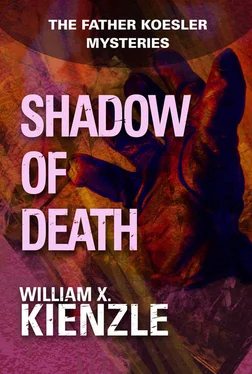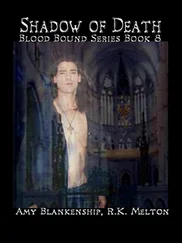“Yes, I know what you mean.”
Koesler and Toussaint separated from the tour group and strolled to a nearby stark fence. A flight of steps led down to the moat, once filled with water from the Thames, but now dry. Several feet beyond the bottom step was an ancient portal. Above the portal was inscribed the words, “Traitor’s Gate.”
“Can you imagine the emotions of all those famous prisoners as they were ferried into this place through that?” Toussaint, in a sweeping gesture, indicated the gate.
Both were silent for a few moments.
“Yes,” said Koesler, “when they heard that gate grate shut behind them, they must have known they had left freedom and now faced imprisonment, possible torture, and probable death. It must have been a terrifying moment.”
“Anne Boleyn, Elizabeth I, Catherine Howard, and Sir Thomas More, among others.” Toussaint enumerated some of the better known personalities who had at different times in history docked at these steps and climbed them to this very spot.
“And poor old Bishop John Fisher,” said Koesler, consulting his Guide to the Tower of London.
“It says here, that both More and Bishop Fisher were imprisoned up there, in the Bell Tower. Of course, the skyline of London has completely changed. But just think: Basically, Fisher and More saw the same things we are now looking at. The same River Thames, the same shores, more or less, the same general land contours—and of course the same fortress prison.”
“And they were here,” Toussaint commented, “only because Henry VIII made himself head of the Church so he could marry the woman he would eventually have executed.”
“Such a waste.”
“You get the impression from reading the history of those times,” said Toussaint, “that the doomed were made to feel grateful to the king for his commuting the manner of execution.”
They began walking toward the site of the block where so many of the executions had taken place.
“Both More and Fisher,” Toussaint sounded almost reminiscent, “had been condemned to be hung, drawn, and quartered. Barbaric! Then the king in his infinite mercy ruled that they simply be beheaded.” He stopped and turned toward Koesler. “You know, the thought just occurred to me, Bob: I wonder how Thomas More would be regarded today if he had been successful in his strategy?”
Koesler thought for a moment. “You mean if he hadn’t been executed? I never thought of that. We do tend to think of him in the role of a martyr. And as a martyr, we picture him marching quite deliberately off to his death for the sake of his faith. Which, of course, he literally did eventually, didn’t he?”
“Yes,” Toussaint replied, “but not before he defended himself as the brilliant lawyer he was. He did not want to die. But he refused to publicly commit himself to agreeing that the king was the head of the Church in England. On the other hand, he did not state that the king was not what His Majesty claimed to be. More maintained that his silence should be legally interpreted as consent to the king, even though he would not so state. And it was only because of perjured testimony that he was convicted. Do you know, Bob, he could be my patron.”
“How’s that?”
“I find that the longer I live, the more I have to live for. I do not know what I would have done had I been in the shoes of Sir Thomas More—none of us does, I suppose—but I believe I would have done the same thing: I would have fought to stay alive.”
“But you brought up an interesting point, Ramon. How would he be regarded if he had succeeded in fighting off the death penalty? He probably would have remained imprisoned in one of these towers for the rest of his life. He would not have been a murdered martyr. I guess one could argue that he might never have been declared a saint. Yet, he would not have disappeared from history. He was too famous. Lord Chancellor of England, author of Utopia, and opponent, if not victim, of King Henry VIII.”
“I think I could have lived with that.” Toussaint smiled. In the distance they could see their guide gathering his group near the Bloody Tower. It was time to leave. Toussaint and Koesler hurried to join the others.
“We’re going to have to stick with the group,” said Koesler, “if we want to see everything on this tour. After all, we’ve got only the one day.”
“At least until we reach Westminster Abbey. I am so eager to get there and do our reconnoitering, I would almost be willing to skip lunch and the visit to St. Paul’s . . . but, all in good time,” concluded Toussaint.
“I should say; especially St. Paul’s. You wouldn’t want to pass up the place where the Marriage of the Century between Prince Charlie and Lady Di took place, would you? Besides, before Henry decided to split with Rome, it used to be one of ours.”
Koesler found that he was breathing heavily just from the rapid walking he’d been compelled to do to catch up with the group before it moved on. He was about to make a resolution to do some jogging when he returned to Detroit. However, he remembered that upon reaching his fortieth birthday he had resolved to stop making ridiculous resolutions.
“Hurry along, ladies and gents. Remember the motto of the Bloody Tower: If we don’t hang together, we’ll hang separately. Stay together now. Stay together. First, we’ll visit St. Paul’s, then we’ll have a lovely luncheon, then the great one—Westminster Abbey—and, finally, the famous Madame Tussaud’s, where, if we’re in any luck at all, we’ll see a likeness of yours truly.”
An appreciative titter from the tourists.
3.
“Now, ladies and gents, we’ve just come in the west entrance of Westminster Abbey. I’d like to call your attention to this plaque in the floor. It marks the grave of the unknown warrior. His body was brought over from France and laid to rest right here, in the presence of King George V himself, on 11 November 1920.
“And over there, you’ll be able to see the memorial to Sir Winston Churchill.”
“Do you get the impression,” said Joe Cox, “ that these places are more mausoleums than churches? I mean, those sarcophagi of Wellington and Lord Nelson in St. Paul’s were humongous. And look at the statues in this place; two to one there’s a body under damn near every one of them.”
“Well,” Pat Lennon responded, “if you go back to the beginning of Christianity, that’s the way it was. Take Rome, for instance: not only were there no Christian churches, but the early Christians were forced to gather and worship underground in the catacombs. And the catacombs were burial places. So, I guess they’ve got the right idea burying people in churches.”
“I don’t know why I let you talk me into this tour.” Cox was on the verge of pouting.
“Quiet! It will broaden you. And besides, we don’t have a story to file until after tonight’s ceremony.”
“Now, ladies and gents, you’re lookin’ at the old abbey in her best get-up. The nave roof, for instance, has just been cleaned extensively and is in its pristine splendor.
“Now, we’re comin’ to the south transept, where we’ll find, among many other memorable relics, the Poets’ Corner.
“You can just imagine, ladies and gents, a little more than a century ago, when the abbey was black with grime, and heavier stained glass windows obscured the light much more than now, it was Washington Irving who referred to this great abbey as ‘the empire of Death; his great shadowy palace, where he sits in state, mocking at the relics of human glory, and spreading dust and forgetfulness on the monuments of princes.’”
“Have you noticed,” Joan Blackford Hayes remarked, “how much more reverential our guide’s tone gets as soon as he finds himself in church?”
Читать дальше












